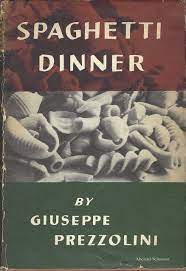Spaghetti Dinner (1955) by Giuseppe Prezzolini
Good Reads Meta-data is 149 pages, rated 0.0 by 0 litizens who have missed a chance to spout off.
Genre: History and cooking
Verdict: A Curiosity only.

About half of this short book is a social history of the development pasta (‘spaghetti’ is used as a generic term for pasta) and its importation to the United States. The other half is made up of recipes, some historical and some contemporary to the original publication date above.
The first half consists of short, illustrated chapters of 8-10 pages or less on the happy discovery of the hard wheat, the early use of the word ‘macaroni’ for all pasta, the wrong and right ways to eat pasta, the stereotypes of pasta eaters and eating through the ages, and so on.
It explains that odd line in the tune Yankee Doodle, ‘he stuck a feather in his hat and called in macaroni.’ In the 18th Century macaroni was brought back to England by grand tourists who had their cooks cook it (badly), and so eating macaroni was the mark of a toff, a dandy, a fad-following aristocrat. A macaroni was a rich layabout.
He also suggests that macaroni went from being a immigrant food in the United States with Prohibition when Italians discovered a new source of income by selling their home-made wine to the thirsty anglos, who might like a meal to go with this sly grog.
The author published not one but two biographies of Niccolò Machiavelli, both of which I have acquired and read. The first was Machiavelli, The Florentine (1929) and the second was Machiavelli (1967). In Italian the latter’s title was Machiavelli, Anticristo (1954). That stimulated me to find out a little about him, and there were two things of note. First, was the above book. The second was that in 1930s he taught Italian literature at Columbia University and was perceived by some as an apologist for the Mussolini regime until 1941. He weathered that storm in the academic tea cup and remained there.

